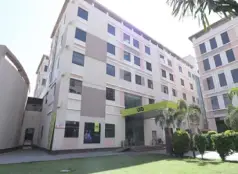Master Of Computer Applications (MCA) Online Degree: A New Gateway To Entering A Technological World
Introduction
Updated as on September 19, 2024: Higher education in the field of information technology has undergone a significant transformation in recent years. With the rise of online education, programs like the Master of Computer Applications (MCA) have become more accessible to those seeking an opportunity to become skilled software professionals like Data Scientist, Software Engineer, Digital Marketer, DevOps Engineer, and other. The MCA is well recognized a postgraduate course offers valuable knowledge and skillset to individuals that can now be pursued from the comfort of one's own home. In this article, we will explore more about online MCA courses, including their benefits, curriculum, career prospects, top MCA colleges for online education, and the future of technology-enabled education. Well, the Online MCA admission process for the 2025-2026 will begin soon tentatively in October 2025. We would like to request all prospective students to check this page regularly for the latest updates on Online MCA Admission 2025.
The Rise of Online Education
Online education has emerged as a game-changer, reshaping the traditional education landscape. The convenience and flexibility it offers have paved the way for various professional courses, including the MCA program, to be accessible to a global audience. With online MCA courses, students are no longer bound by geographical constraints, making it possible for working professionals, international students, and those with family commitments to pursue higher education without uprooting their lives.
Benefits of Online MCA Course - Know in Detail
- Flexibility: Online MCA courses gives students the freedom to learn at their own pace. This flexibility is especially valuable for individuals juggling work, family, and education.
- Accessibility: Students from different corners of the world can enroll in top-notch MCA programs without the need to relocate. This global reach enhances diversity in perspectives and experiences within the virtual classroom.
- Customized Learning: Online courses often incorporate adaptive learning technologies that tailor the curriculum to individual learning styles, ensuring effective comprehension and retention.
- Cost-Efficiency: Online MCA courses eliminate the need for commuting and sometimes even housing expenses, making quality education more affordable and accessible.
- Interactive Learning: Contrary to misconceptions, online learning can be highly interactive. Virtual classrooms, discussion forums, and live sessions foster engagement among students and instructors.
Top reasons for beginning an Online MCA Admission Process with YuvaMind
- Top-notch universities in India: We at YuvaMind are official partners with India's top-rated universities for online MCA degree program admission counseling.
- Career Oriented Syllabus: At the University, we have a specialized curriculum that focuses on career development and is created by our team of expert faculty.
- Best-in-class Learning Management System: We conduct classes with the best interactive applications.
- 100% Placement Assistance: A placement cell of the university works hard to invite top MNCs for the placement drive.
Curriculum and Course Structure
Online MCA courses typically mirror the curriculum of traditional, on-campus programs. The curriculum is designed to equip students with a comprehensive understanding of computer science concepts, programming languages, software development methodologies, and practical application skills. Common subjects covered in the online MCA curriculum include:
- Programming Languages: In-depth study of languages like Java, C++, Python, and more, enabling students to build robust applications.
- Database Management: Learning about database systems, data modeling, SQL, and NoSQL databases to manage and analyze data effectively.
- Web Technologies: Understanding web development frameworks, HTML, CSS, JavaScript, and server-side scripting for creating dynamic web applications.
- Software Engineering: Exploring the software development lifecycle, project management, software testing, and quality assurance practices.
- Networking and Security: Gaining insights into computer networks, cybersecurity, and encryption techniques to safeguard digital assets.
- Artificial Intelligence and Machine Learning: Introduction to AI and ML concepts, algorithms, and applications that are transforming various industries.
- Mobile App Development: Learning to develop applications for mobile platforms, addressing the booming demand for mobile software.
Admission Process
The admission process for an Online MCA (Master of Computer Applications) course typically involves several steps. Keep in mind that specific requirements and procedures may vary between institutions, so it's essential to check the admission guidelines provided by the particular university or college where you intend to apply. Here is a general outline of the admission process:
Research and Choose a College/University
Begin by researching and identifying colleges or universities that offer Online MCA programs. Ensure that the institutions you consider are accredited and recognized.
Review Eligibility Criteria
Check the eligibility criteria for the Online MCA program at your chosen institution. Common requirements may include a bachelor's degree, a specific percentage of marks, and mathematics as a compulsory subject in 10+2 or graduation (any subject).
Prepare Required Documents
Gather the necessary documents for the application process. Commonly required documents include:
- Academic transcripts and certificates
- Proof of identity (e.g., Aadhar card, passport)
- Passport-sized photographs
- Category certificate (if applicable)
- Character certificate
- Entrance exam scorecard (if required)
Fill out the Online Application Form - Steps you all need to follow
- Visit the official website of the college or university offering the Online MCA program.
- Locate the online application form for the MCA course.
- Fill out the application form with accurate information. Provide all requested details and ensure that you meet the application deadlines.
Pay Application Fee
Pay the application fee as specified by the institution. Payment methods may include online payment gateways, bank drafts, or other specified modes of payment.
Career Prospects
Completing an online MCA course opens up a world of lucrative career opportunities:
- Software Developer: Crafting software solutions by coding, testing, and debugging programs to meet specific needs.
- Web Developer: Creating websites and web applications, from layout design to functionality, to enhance user experiences on the internet.
- Database Administrator: Managing and organizing an organization's data infrastructure, ensuring data security and availability.
- Systems Analyst: Evaluating an organization's IT needs and designing technology solutions for improved efficiency.
- Machine Learning Engineer: Building and deploying machine learning models to derive valuable insights from data.
- Cybersecurity Analyst: Safeguarding digital assets by implementing security measures and responding to security breaches.
- IT Consultant: Offering expert advice to organizations on leveraging technology to achieve business objectives.
The Future of Online Education and MCA
The rapid growth of online MCA courses mirrors the broader trends in digital education. The future holds even more promise, with advancements in virtual reality (VR), augmented reality (AR), and immersive learning experiences. These technologies will further enrich the learning process, enabling students to interact with complex concepts in unprecedented ways.
Conclusion
Online MCA courses have revolutionized postgraduate education in the field of computer applications. The combination of convenience, flexibility, and a comprehensive curriculum empowers students to embark on successful careers in various IT domains. As technology continues to evolve, so too will the methods of education, ensuring that the journey of learning remains exciting, accessible, and aligned with the needs of the digital era.




















